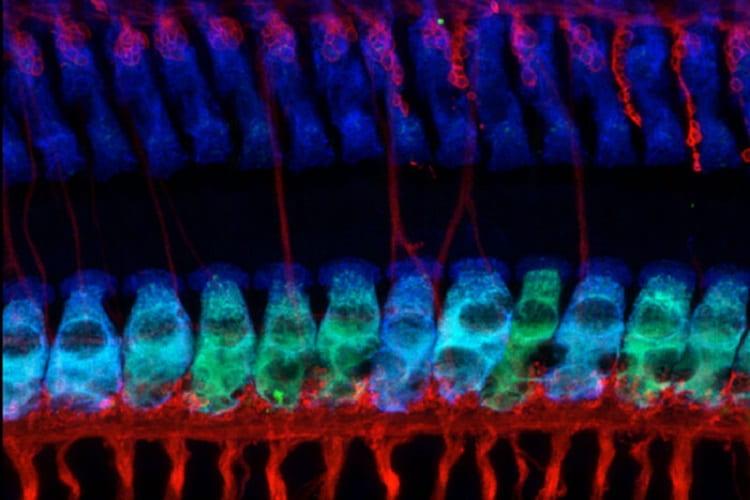Loud noise can damage the inner ear and cause hearing loss. Studying mice, researchers at Washington University School of Medicine in St. Louis and the University of Iowa have shown that a drug compound can block damage caused by loud noise, raising the possibility of medication that prevents noise-induced hearing loss.
The study is published the week of Feb. 3 in the Proceedings of the National Academy of Sciences.
The spiral-shaped cochlea of the inner ear is responsible for detecting sound. Inner hair cells lining the cochlea transform the mechanical vibrations of sound waves into chemical signals. These chemicals — primarily one called glutamate — are then released from the hair cells and received by glutamate receptors on the auditory nerve fibers that then send electrical impulses to the brain. There, the signals are interpreted as language, music or signs of danger, for example.
The junction between a hair cell and a nerve fiber is called a synapse. Loud noise can release too much glutamate, overwhelming the glutamate receptors, which leads to loss of synapses and, eventually, a condition called sensorineural hearing loss. More than 460 million people worldwide live with hearing loss that negatively impacts their daily lives, according to the World Health Organization. By 2050, that number is projected to increase to more than 900 million.
“Sensorineural hearing loss is the most common sensory deficit worldwide, and there are no medicinal treatments for preventing it,” said co-author Mark A. Rutherford, PhD, an assistant professor of otolaryngology at Washington University. “Glutamate receptors are essential for hearing, but overstimulating them can lead to irreversible damage to synapses. What we have found is that glutamate receptors are not all the same, allowing us to block some while leaving others unblocked. When we blocked one subclass of glutamate receptor while leaving the other active, we prevented the damage while maintaining hearing function.”
